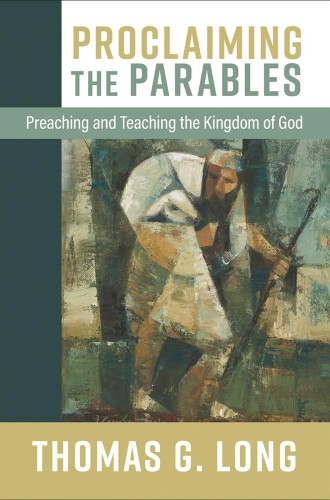The kingdom of God is like this
Tom Long’s invigorating new book empowers preachers to preach on and with the parables of Jesus.

Proclaiming the Parables
Preaching and Teaching the Kingdom of God
In Resident Aliens, Stanley Hauerwas and I warned that seminary biblical courses sometimes disempower budding preachers: See? You’ll never have the linguistic, analytical, or historical skills to preach a biblical sermon. In contrast, Thomas Long has written a voluminous, sweeping, occasionally even thrilling book that will empower preachers to preach on and with the parables of Jesus. Along the way, he schools a few biblical scholars.
Over four decades, at a half dozen seminaries, Long taught his legendary course on preaching the parables. This was a momentous period for parables research. Dan Otto Via, John Dominic Crossan, Klyne Snodgrass, R. Alan Culpepper, John Stott, and many other scholars shoved parables front and center, mining them as the distinctive element of Jesus’ teaching and preaching. Long has read all of their books, it seems. Preachers will love his astute distillation of these scholars’ findings, as well as his occasional mocking of their vaunted discoveries.
Read our latest issue or browse back issues.
Long taught that parables could be sly, explosive, disruptive, and mind-grabbing. But he had to admit that most of his students’ sermons on the parables were just . . . well, sermons. Then he received a revelation. When Jesus says, “The kingdom of God is like this,” it’s not just a rhetorical device. With those words, a theological event is taking place. Long puts it this way: “The purpose of parables is not merely to talk about the kingdom of God but instead to take us to those places all around us where the inbreaking of God’s kingdom can be perceived and experienced.”
Long’s discovery led to a fresh awareness: the power of parables is “the kingdom of God to which they refer.” Parables do more than talk about God’s kingdom; they also instigate it. They’re not just stories about God; they’re from God. In Jesus’ parables, God answers our “thy kingdom come” prayers, albeit with unexpected people and places. Long quotes Austin Farrer: “Christ does not save us by acting a parable of divine love; he acts the parable of divine love by saving us. That is the Christian faith.”
Proclaiming the Parables is both an invigorating homiletical textbook and a groundbreaking biblical commentary. As in his preaching, Long’s witty parabolic asides make for fun reading—and some long overdue puncturing of the biblical guild’s pretensions. For over a century since Adolf Jülicher, scholars have savored the rhetorical impact of parables: Allegory? Simile? Metaphor? Joke? Let’s all stand back and marvel at how the literary gears and levers of parables do their extraordinary intellectual work. Not good enough, says Long, noting that Jülicher’s “suspiciously non-Jewish” Jesus sounds “more like a nineteenth-century German professor” than a first-century rabbi.
Long compares C. H. Dodd’s influential characterization of parables as clever thought teasers to a sports car of the 1950s: cute and snazzy, but an unreliable means for getting a preacher home. He accuses Robert Funk and other members of the Jesus Seminar of hyperbolic excess in their praise of parables as literary shock and awe:
If someone were to run on stage at the Super Bowl halftime show, steal the mic from, say, Eminem or Snoop Dog or Rihanna, and, before security muscled them off, were to recite to the startled crowd one of Jesus’ parables, maybe the Mustard Bush or the Seed Growing Secretly, the crowd would probably be confused, perhaps intrigued, but would almost surely not experience mythical shock, transformation, a loss of control, and their lives being torn apart.
As for William Herzog’s invigorating, liberatory, revolutionary Marxist take on the parables, Long suspects it is but the most recent attempt to make the parables talk like us in ways we want to hear, only faintly resembling the Jesus of Mark, Matthew, and Luke. “We are called to be ‘on hand’ for God’s kingdom, which is always ‘at hand,’ but is never in our little hands to claim as territory, even in Oklahoma,” smirks Long.
My takeaway from this book is that you don’t need to be a preacher to understand and experience Jesus’ parables fully, but preaching helps. Parables preach. They want to do something to those who hear them: break out the kingdom. The seed that mysteriously sprouts, the yeast that rises a ridiculously large lump of dough, the extravagant party thrown for the homecoming of a wayward child, the wounded victim saved by the wrong person. Surprise! The kingdom is among us, and we didn’t know it until the preacher told us a story. One moment you’re listening to a strange little tale about God’s invasion; next thing you know, you’re part of it. Long puts it this way: “The main power of parables is in their capacity to point to what God is doing in the world, that is, to the kingdom of God. The power is not in the trope, but in the referent.”
A warning for preachers: Reading Proclaiming the Parables will take a while. Every biblical parable is present and accounted for. Long takes each text—obediently and playfully—and summons a wide range of illustrations, unexpected connections, and startling examples. He listens to one of Jesus’ stories and then thinks of Tennessee Williams, Flannery O’Connor, The New Yorker, or Morna Hooker. Long’s introductory framing of Matthew’s parables is the best you’ll find. His exposition and homiletical presentation of the parable of the wicked tenants is unparalleled. Never again will you preach the mustard seed as you’ve preached it before. On almost every one of these 400-plus pages, you’ll be pausing to jot down notes for a sermon, the realm of God breaking out as you read a book about it.
Time and again, Long exemplifies what he is talking about, demonstrating that parables are meant not only to be preached but also to preach. “Our task is not to explain the parables but to proclaim them,” he writes. “We allow the parable to disclose where God is at work in the world, and with amazement we are privileged to announce this event.” Here’s an outstanding book to help preachers do just that.






